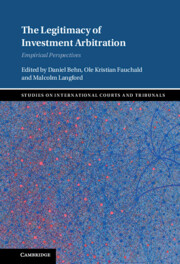Book contents
- The Legitimacy of Investment Arbitration
- Studies on International Courts and Tribunals
- The Legitimacy of Investment Arbitration
- Copyright page
- Contents
- Figures
- Tables
- Contributors
- 1 Introduction: The Legitimacy Crisis and the Empirical Turn
- 2 The International Investment Regime and Its Discontents
- Part I Process Legitimacy
- 3 Testing Cognitive Bias: Experimental Approaches and Investment Arbitration
- 4 The Influence of Law Firms in Investment Arbitration
- 5 Arbitrator Challenges in International Investment Tribunals
- 6 Dissents in Investment Arbitration: On Collegiality and Individualism
- Part II Process Legitimacy
- Part III Output Legitimacy
- Part IV Legitimation Strategies
- Index
3 - Testing Cognitive Bias: Experimental Approaches and Investment Arbitration
from Part I - Process Legitimacy
Published online by Cambridge University Press: 06 January 2022
- The Legitimacy of Investment Arbitration
- Studies on International Courts and Tribunals
- The Legitimacy of Investment Arbitration
- Copyright page
- Contents
- Figures
- Tables
- Contributors
- 1 Introduction: The Legitimacy Crisis and the Empirical Turn
- 2 The International Investment Regime and Its Discontents
- Part I Process Legitimacy
- 3 Testing Cognitive Bias: Experimental Approaches and Investment Arbitration
- 4 The Influence of Law Firms in Investment Arbitration
- 5 Arbitrator Challenges in International Investment Tribunals
- 6 Dissents in Investment Arbitration: On Collegiality and Individualism
- Part II Process Legitimacy
- Part III Output Legitimacy
- Part IV Legitimation Strategies
- Index
Summary
Global law firms and their prominent postion in the investment arbitration market is under-appreciated; yet there is a sound hypothesis that law firms seek to establish and maintain their social capital in the arbitration field in a similar manner as individuals such as arbitrators and counsel, as was captured in Dezalay and Garth’s pioneering study. Building on the social networks of arbitrators, this study focuses on the relationships between the most influential arbitrators and the most influential law firms in the system and how these relationships might create real or perceived conflicts of interest issues for the ISDS system. Using mixed methods – integrated network, statistical and doctrinal analyses – the chapter documents how the law firms have gained a central position in the ISDS network by establishing strong relationships to leading arbitrators. The author finds that the top law firms have positioned themselves as ‘gatekeepers’ to the ISDS system, in particular in terms of distribution of cases among potential arbitrators and the acceptance of new arbitrators, and discusses possible impacts on the perceived independence and legitimacy of the ISDS system.
Keywords
- Type
- Chapter
- Information
- The Legitimacy of Investment ArbitrationEmpirical Perspectives, pp. 85 - 99Publisher: Cambridge University PressPrint publication year: 2022

